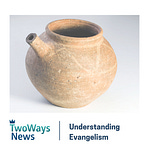Rummaging around through my digital files last week, I discovered this paragraph:
The very experience of 21st century living, with its utterly bewildering array of nearly limitless choice—in knowledge, information, entertainment, commodities, interests, lifestyles, and so on—has the psychological effect of fragmenting our lives, and destroying any illusion that there might be one overarching truth or ‘big story’. There is no fixed truth, no unifying story, no galvanizing purpose. There is nothing that explains me, or locates me in the world as part of a fixed tradition or community. Everything is difference, diversity, plasticity, fluidity. It is up to the individual to try to fashion some satisfactory ‘self’, some thing that is uniquely and authentically ‘me’, by selecting from the google-sized cultural menu.
It’s from an article I wrote 15 years ago reviewing David Wells’s book Above all Earthly Pow’rs: Christ in a Postmodern World, which I suspect many of you will never have heard of, but which was quite the thing in 2007. Books are like sermons in this regard. Even the best of them get forgotten; it just takes a little longer.
I came across this article because I was searching for background reading on truth and lies, in preparation for the CCL event on ‘Deception’ that’s coming up next week. (It’s not too late to register!) And Wells’s book casts a fascinating perspective on that subject. He charts the collapse of the modernist confidence of the Enlightenment, that humanity could find its own way to the truth about life and the universe.
The Enlightenment project failed, he suggests, for a number of reasons. At one level, it simply failed to deliver. The modernist dream was that humanity would craft its own destiny, and that science and education would lead us all into a unified bright new tomorrow. We were promised progress, enlightenment, knowledge and an inspiring humanist quest for truth. Instead we got the holocaust, propaganda, a nuclear arms race and environmental degradation.
But it also failed, he argues, because of the very structure of its thought, and all that followed from it. The Enlightenment ideal is profoundly individualistic. Human reason and experience is sovereign, which means that my reason and experience is sovereign—so who are you to tell me what to do? Or to tell me what constitutes ‘progress’? Or what ‘truth’ is?
In the end, Wells argues, the Enlightenment dream buckled, sagged and collapsed under the massive variety and weight of the consumer options that have opened before 21st century Westerners. We didn’t become ‘postmodern’ because we all started reading Derrida and Foucault but because contemporary culture is built on ‘you doing you’ and ‘me doing me’ (as we now say it), and we now have the financial and technological resources for us to try to do just that. Postmodern culture is an individualistic consumer culture in which I define meaning for myself by what I buy and choose and experience; by how I thus create the unique thing that is ‘me’.
So what does this mean for how we think about lying and deception in a postmodern world?
Disappointingly for my preparation, Wells doesn’t explore this angle, nor (therefore) did my review.
His interest lies elsewhere, in how the postmodern crisis of ‘truth’ relates to how Christians preach the gospel.
And so, as is so often the case when you rummage around in old books and articles, I found myself going down a completely different rabbit hole. But it was also one that very much relates to current events and issues.
The big issue for Wells—and it is still very much ours 15 years later—is how secular, postmodern people deal with the fracturing of truth and meaning, and how churches deal with it, as they reach out with the gospel in this environment.
He notes that while church-going and general trust in Christianity has declined in the West, interest in ‘spirituality’ and ‘spiritual experience’ has not. He cites a survey showing how in the same period in which church attendance in Britain fell from 28% to 8% of the population, the number of people who described themselves as ‘spiritual’ or having had ‘spiritual experiences’ rose from 48% to 76%.
There is a spiritual yearning there. Can Christians bring the gospel to that spiritual yearning?
Here is where Wells asks a crucial question that many others in the early 21st century weren’t asking, and are still not asking: Just what kind of spiritual yearning does the postmodern person typically have?
Here’s my summary and reflection on his answer (from the 2007 review):
As Wells describes it—and his analysis rings very true—the current spiritual quest is intensely personalized, individualized and eclectic. It is part of the postmodern person’s project to make their life happy, satisfying, fulfilled and meaningful. It is about finding something real and meaningful in my life, given that I have lost confidence in a big Answer coming from an outside God. It’s like another panel on my Facebook page: my spirituality. And I may draw on tidbits of whatever spiritual knowledge or technique will help with that search and that process.
Here Wells comes to one of the key insights of this very insightful book. He argues that while the postmodern spiritual yearning has unique features thrown up by the particular cultural forces of our time, in its core structure and nature it bears a striking resemblance to a kind of spirituality that Christians have done battle with long before in the 2nd and 3rd centuries AD—the ancient form of primal spirituality that took the form of gnosticism. It too was a spirituality intensely distrustful of dogma and external revelation. It too was a deeply privatised spirituality where the sacred was approached through the self. And it too was a spirituality that reached from man to God, attempting to find salvation and blessing apart from the grace of Christ.
In other words, gnosticism was not a close cousin to Christian spirituality, a kind of fellow-traveller or precursor to Christian understanding. It was its diametric opposite and enemy. And when such a rival is on the field, adaptation, dialogue and tactical engagement are not viable strategies. The only appropriate response, argues Wells, is confrontation—otherwise known as “speaking the truth in love” (Eph 4:15).
The early church perceived this, vigorously opposed gnosticism, and was granted in God’s kindness a history-making victory.
The church at the end of the 20th century, on the other hand, has seen the self-focused, anti-revelational, lifestyle-oriented spirituality of our time as a phenomenon not to be confronted but to be accommodated. By seeing merely the surface attitude of ‘seeking’, and not the deep antipathy between the two kinds of spirituality, modern evangelicals have filled megachurches with people who don’t trust revelation, filter their experience of God through the self and its desires, and come along because the breezy, interactive, virtually contentless meetings make them feel good, and contribute to the project that is their lifestyle.
This is a vital point as we think about reaching our culture with the gospel. The desires, wants and spiritual yearnings of postmodernity are not a variation on Christian spirituality. They are as starkly opposite and as deadly to Christian thought and practice as was gnosticism …
Wells sharply criticises the ‘seeker-service’ movement for not perceiving this, and for offering a revelation-less, repentance-lite, therapeutic spirituality which gives unchurched baby boomers exactly the spiritual package they want—one that helps them to sustain relationships, handle stress, improve their life, and all without relinquishing their fundamental autonomy over their lives…
… This is the danger for evangelicals as we think about how Christ can be preached to a postmodern world … We see a particular demographic group before us—Generation X or Y or Z, or seniors or juniors or whoever it might be—and we begin to feel that if only we could find the key to their heart, the cultural pheromones that would attract them to us, then we would surely be able to win them over to Christ. If we can only craft our package in such a way as to show them Christ is the answer to their spiritual yearnings—for meaning, for relationships, for community—then to Christ they will turn.
So I started reading this old article thinking it might help me think about truth and lies. But instead it got me juiced up again about the gospel and truth and evangelistic strategy—which has also been much on my mind recently. The new Learn the Gospel resource is now officially launched and available, and just last Friday I submitted the final manuscript of an evangelistic book based on Two ways to live.
For both of those resources, one of the key convictions is that the gospel—in our knowledge of it and preaching of it—is a truth claim. It doesn’t seek to mould itself to the desires of its hearers but to call on them to repent of those desires in light of the truth about the life, death and resurrection of Jesus Christ. It proclaims a true reality beyond myself that calls upon me to spurn my self-focus and personal gnosticism, and turn to God in Christ.
The alternative idea that ‘truth’ comes from within and is personal is not new (as Wells points out). No doubt the current, postmodern version of this has its own unique features, but it is a species of the age-old and ever-present human problem—which is to reject the real truth of God, and replace it with a ‘truth’ of our own making. And when confronted about this reality, we excuse ourselves and say, like Pilate, “What is truth?”
In reaching out to a post-truth or anti-truth culture, it’s easy to lose our nerve. I don’t know how many times in the past 15 years I’ve had someone say to me some variation of the following: “Yes, I know the gospel proclaims the truth, and I believe that. But is ‘truth’ something that resonates with people today? We’re not a ‘truth’ generation. We’re more interested in what works in our lives. We’re more likely to get evangelistic traction if we can show them that Christianity makes a difference to them personally, that it solves their deepest problems …” And so on and so forth.
This is profoundly mistaken, and sends us down the road towards the kind of pop-culture liberalism that Wells warned us about in 2007.
The gospel can’t negotiate with the individualistic, secular gnosticism of the 21st century, any more than it could in the 2nd and 3rd centuries. In proclaiming the victory and lordship of Jesus, we’re bringing news of liberation from our enslaving, self-focused desires, not the fulfilment of them.
The final sentence of my article in 2007 put it this way:
The world may seek a million ways to live, but we preach two ways to live.
PS
If you’d like to come along to the CCL event on Deception, or tune in via livestream (personally or in your small group), you’ll need to register post-haste. All the details are here.
As I mentioned above, the wait is also (finally) over for getting hold of the first of the new Two ways to liveresources. For those who haven’t caught up with this, the old Two ways to live training course has been divided in half and completely rewritten. It now comes in two parts:
Learn the Gospel: a book/course to teach Christians what the gospel is (using the 2wtl framework).
Share the Gospel: a book/course on how to share that gospel with others in everyday life and conversation.
It’s the first of those that is now available. It consists of a very nicely produced book, plus free online videos, and is designed to be very easily done in existing small groups. Check out all the details here.











